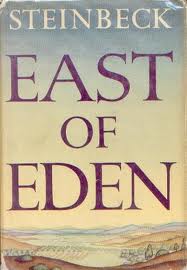I fell in love with John Steinbeck’s “East of Eden” many years ago after it was recommended to me by Rabbi Lawrence Kushner, one of my spiritual teachers. One of the reasons I find it so meaningful has to do with the following discussion that takes place between the three main characters late in the narrative. It’s a conversation between Lee, the long-time Chinese housekeeper/nanny, head-of-household Adam, and their friend Samuel. (I’ve taken some editorial liberties for brevity’s sake.) Lee begins:
“Do you remember, nearly ten years ago, when you read us the sixteen verses of the fourth chapter of Genesis and we argued about them? Well, the story bit deeply into me and I went into it word for word. The more I thought about the story, the more profound it became to me. Then I compared the translations we have — and they were fairly close. There was only one place that bothered me. The King James version says this — it is when [God] has asked Cain why he is angry. [God] says, ‘If thou doest well, shalt thou not be accepted? and if thou doest not well, sin [crouches] at the door. And unto thee shall be his desire, and thou shalt rule over him.’ It was the ‘thou shalt’ that struck me, because it was a promise that Cain would conquer sin.”
“Then I got a copy of the American Standard Bible. It was very new then. And it was different in this passage. It says, ‘Do thou rule over him.’ Now this is very different. This is not a promise, it is an order. And I began to stew about it. I wondered what the original word of the original writer had been that these very different translations could be made.”
Samuel put his palms down on the table and leaned forward and the old young light came into his eyes. “Lee,” he said, “don’t tell me you studied Hebrew! I want to know why you were so interested.”
“Well, it seemed to me that the man who could conceive this great story would know exactly what he wanted to say and there would be no confusion in his statement.”
“You say ‘the man.’ Do you then not think this is a divine book written by the inky finger of God?”
“I think that the mind that could think this story was a curiously divine mind. We have had a few such minds in China, too. Well, to go on, I went to San Francisco to the headquarters of our family association. I went there because in our family there are a number of ancient revered gentlemen who are great scholars. They are thinkers in exactness. A man may spend many years pondering a sentence of the scholar you call Confucius. I thought there might be experts in meaning who could advise me. I respectfully submitted my problem to one of these sages, read him the story, and told him what I understood from it. The next night four of them met and called me in. We discussed the story all night long.”
Lee laughed. “Can you imagine four old gentlemen, the youngest is over ninety now, taking on the study of Hebrew? They engaged a learned rabbi. They took to the study as though they were children. Exercise books, grammar, vocabulary, simple sentences. You should see Hebrew written in Chinese ink with a brush!”
“I went along with them, marveling at the beauty of their proud clean brains. I began to love my race, and for the first time I wanted to be Chinese. Every two weeks I went to a meeting with them, and in my room here I covered pages with writing. I bought every known Hebrew dictionary. But the old gentlemen were always ahead of me. Mr. Hamilton, you should have sat through some of those nights of argument and discussion. The questions, the inspection, oh, the lovely thinking — the beautiful thinking.”
“After two years we felt that we could approach your sixteen verses of the fourth chapter of Genesis. My old gentlemen felt that these words were very important, too — ‘Thou shalt’ and “Do thou.’ And this was the gold from our mining: ‘Thou mayest.’ ‘Thou mayest rule over sin.’ The old gentlemen smiled and nodded and felt the years were well spent. It brought them out of their Chinese shells too, and right now they are studying Greek.”
Samuel said, “It’s a fantastic story. And I’ve tried to follow and maybe I’ve missed somewhere. Why is this word so important?”
Lee’s hand shook as he filled [their cups with ng-ka-py]. He drank his down in one gulp. “Don’t you see?” he cried. “The American Standard translation orders men to triumph over sin, and you can call sin ignorance. The King James translation makes a promise in ‘Thou shalt,’ meaning that men will surely triumph over sin. But the Hebrew word, the word timshel — ‘Thou mayest’ — that gives a choice. It might be the most important word in the world. That says the way is open. That throws it right back on a man. For if ‘Thou mayest’ — it is also true that ‘Thou mayest not.’ Don’t you see?”
“Yes, I see. I do see. But you do not believe this is divine law. Why do you feel its importance?”
“Ah!” said Lee. “I’ve wanted to tell you this for a long time. Any writing which has influenced the thinking and the lives of innumerable people is important. Now, there are many millions in their sects and churches who feel the order ‘Do thou’ and throw their weight into obedience. And there are millions more who feel predestination in ‘Thou shalt.’ Nothing they may do can interfere with what will be. But ‘Thou mayest’! Why, that makes a man great, that gives him stature with the gods, for in his weakness and his filth and his murder of his brother he has still the great choice. He can choose his course and fight it through and win.” Lee’s voice was a chant of triumph.
Adam said, “Do you believe that, Lee?”
“Yes, I do. Yes, I do. It is easy out of laziness, out of weakness, to throw oneself into the lap of deity, saying, ‘I couldn’t help it; the way was set.’ But think of the glory of the choice! That makes a man a man. A cat has no choice, a bee must make honey. There’s no godliness there. And do you know, those old gentlemen who were sliding gently down to death are too interested to die now?”
Adam said, “Do you mean these Chinese men believe the Old Testament?”
Lee said, “These old men believe a true story; and they know a true story when they hear it. They are critics of truth. They know that these sixteen verses are a history of humankind in any age or culture or race. They do not believe a man writes fifteen and three-quarter verses of truth and tells a lie with one verb. Confucius tells men how they should live to have good and successful lives. But this — this is a ladder to climb to the stars.” Lee’s eyes shone. “You can never lose that. It cuts the feet from under weakness and cowardliness and laziness.”
Adam said, “I don’t see how you could cook and raise the boys and take care of me and still do all this.”
“Neither do I,” said Lee. “But I take my two pipes in the afternoon, no more and no less, like the elders. And I feel that I am a man. And I feel that a man is a very important thing — maybe more important than a star. This is not theology. I have no bent towards gods. But I have a new love for that glittering instrument, the human soul. It is a lovely and unique thing in the universe. It is always attacked and never destroyed — because ‘Thou mayest.’”


